The legendary American copywriter Joseph Sugarman said the purpose of copywriting, “is to cause a person to exchange [their] hard-earned money for a product or service.”
Copywriting gives your marketing a soul and defines your law firm’s tone of voice, i.e., the mood or emotion you convey online to your audience through specific word choice and writing style. Law firm copywriting, in particular, shouldn’t be underestimated- it’s important for all types of law firms and lawyers. To be effective, it must communicate what makes your law practice unique and well-qualified, and, even more vitally, it has to convert.
Your website and all your marketing material contain copy. What you say and how you say it leaves an impression on potential clients- it’s like an introductory conversation. Be sure you make a good and memorable first impression.
Here’s how to do law firm copywriting in the most persuasive and effective way.

Why Is Copywriting Essential for Law Firms?
To a large extent, what prospective clients think of you comes down to the way you phrase your words, your choice of words, and the level of integrity they convey. Good legal copy hooks clients, keeps them reading, and compels them to call.
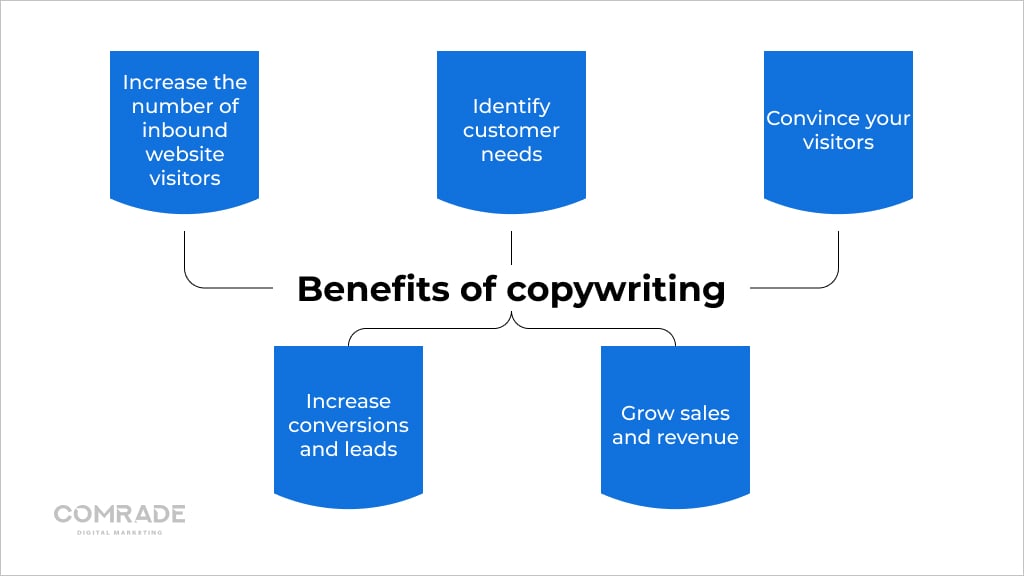
Benefits of Legal Copywriting for Lawyers
Copywriting is essential to connect with your ideal clients and can be used to:
Transform Legal Knowledge into Actionable FAQ Content
FAQs are an excellent tool to increase your law firm website’s visibility in search engine results for relevant queries. Here’s the crux: Your potential clients might not even know they need an attorney.
Instead, they’ll ask Google, “What do I do if I slipped and fell at work in Chicago?” or “Do I have to report a criminal record to future employees in New York?”
As an experienced lawyer, you can address these thorny questions as part of your law firm content marketing strategy to lead them further down the sales funnel. However, you’ll need good legal copywriting skills to explain things in a simple and understandable manner.
Always write to empower everyday people, so they hire you because they know exactly how you can help them and are 100% confident in your professional capabilities.
Showcase Your Legal Knowledge and Personality
Today’s law firms have a proactive marketing approach—they can’t just rely on referrals or word-of-mouth alone to grow leads. Whether you’re creating content for your blog or marketing materials, or website copy, you need to communicate what makes your law firm better than your competition, in a customer-centric way.
Your law firm requires good copywriting to create social media posts, write thought leadership blogs, and communicate with prospects online. Sure, accurate, informative writing on legal issues will never be unfashionable or stop being relevant, but it’s more interesting for clients to read if it’s written by you.
New clients want to know who you are as a firm before they schedule a consultation. That’s why good copy attests to your legal knowledge, your practice’s ethos, and your personality. It gives your law firm a unique brand voice.
If there’s a cliché that applies to both life and copywriting, it is this: “It’s not what you say, but how you say it that makes all the difference.”
Ready to craft compelling content that resonates with your audience and ranks higher on search engines? Dive into our latest blog post on SEO copywriting techniques.
Differentiate Your Specialty
57% of clients find a lawyer with an online search. When prospective clients look online for specific types of law firms, Google lists plenty of options. When two reputable law firms offer the same services and are equal in reputation, how do they convert customers?
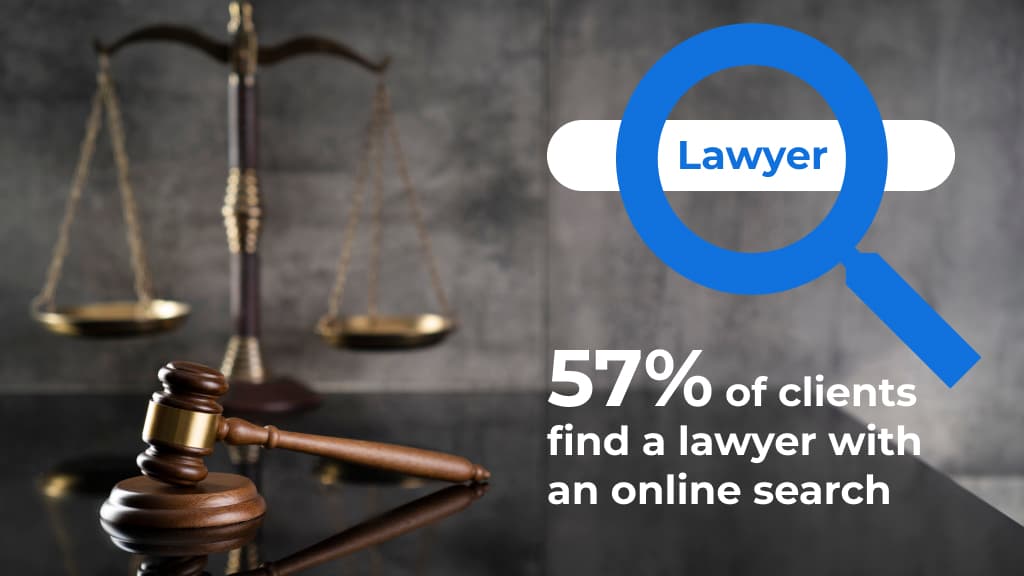
Client conversion relies on convincing copywriting. Great copywriting can persuade prospective clients with a fresh perspective. Take a look at the website of Barr & Douds Attorneys our copywriters worked on. One of their unique selling points is that their attorneys are from the communities they serve.
While competitors might offer the same legal services, they won’t necessarily be from the same communities, and so this personalized approach sets Barr & Douds Attorneys apart. It’s a good example of how to successfully incorporate storytelling into your copywriting approach.
Ready to attract and convert more clients for your law practice? Dive into our blog post on social media marketing for law firms.
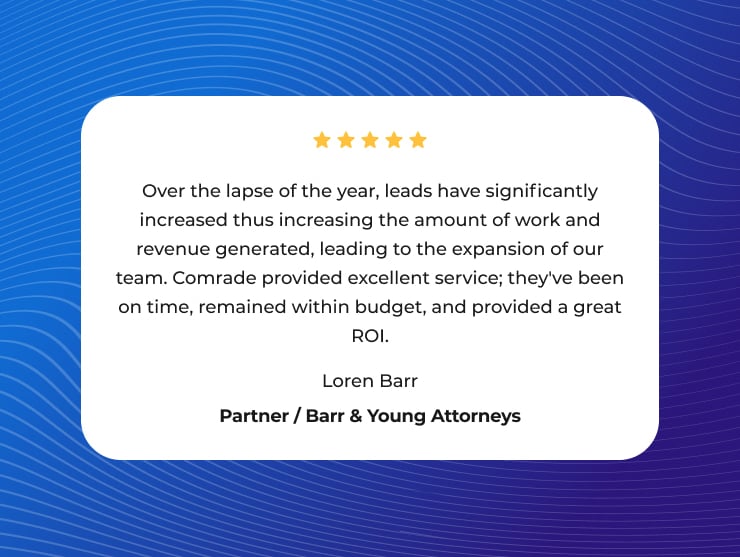
Strengthen Your SEO and Marketing Strategy
When clients search for a law firm and click on the first few websites that pop up in a Google search, they experience copywriting and SEO in action. Not only does SEO copywriting (more on that soon) help your website show up in search engine results, but it also attracts new clients.
Chances are that legal copywriters knew exactly which phrases to use in those website descriptions and titles before visitors even clicked on their links. When a law firm shows up in search results for specific queries, it’s because its copywriter has pre-empted which words to use, based on research by marketing strategists.
The more your website appears on search results, the higher it climbs until it reaches the top. And the more optimized your marketing content and website copywriting are, the higher the chances of improving organic traffic.
Don’t miss out on the latest strategies for law firm marketing success! Visit our blog to learn how to craft an effective marketing plan.
A Copywriting Style Guide for Lawyers
Crafting compelling copy is essential for establishing a strong brand presence, particularly in the legal industry. Every stylistic choice matters, even the seemingly insignificant ones, as they can shape your brand’s authority and professionalism. Consistency is key, and avoiding inconsistencies in your writing style is crucial to maintaining a polished and well-managed image.
Consider the following stylistic choices commonly found in legal writing:
- Word usage: Decide on the appropriate terminology, such as “victim/survivor” or “crash/accident,” that best suits your target audience and resonates with their understanding of the legal context. Some lawyers prefer more compassionate language, while others may prefer more legally authoritative jargon.
- Descriptive terms: Choose consistent terms for parties involved, like “plaintiff and defendant” or other terms such as “employee and manager” or “consumer and business,” to ensure clarity and coherence throughout your content.
- Punctuation choices: Determine whether you prefer using the serial comma, em dash, or specific header capitalization and punctuation guidelines to maintain a cohesive and professional appearance.
By implementing a style guide tailored to your law firm’s needs, you can consistently deliver high-quality, effective copy that leaves a lasting impression on your target audience.
Ethics of Legal Copywriting
When it comes to legal copywriting, it’s crucial to uphold ethical standards to maintain professionalism and comply with regulatory guidelines. We understand that lawyers may not initially anticipate the need to navigate marketing considerations, which is why we’ve compiled insights on the ethics of legal copywriting to help you make informed decisions.
- Precision in language: Avoid definitive statements that may create unjustified expectations. Instead, opt for a qualifying language that acknowledges variations and possibilities.
- General information: While writing content, ensure you stay within the boundaries of providing general information rather than specific legal advice. Offer hypothetical scenarios to illustrate concepts without crossing into the realm of giving personalized guidance.
- Blogging and advertising: Blogs often have different rules compared to traditional advertising. Familiarize yourself with the regulations in your jurisdiction to understand which guidelines apply specifically to blogs or educational content.
- Contingency fees: When discussing your firm’s contingency fee structure, exercise caution to comply with bar requirements. Keep your descriptions general and consult your jurisdiction’s rules on professional responsibility before publishing.
- Past successes and verdicts: State ethics opinions may govern how you discuss past successes and verdicts. Ensure that any statements are factually accurate, accompanied by disclaimers if necessary, and adhere to the rules and advisory opinions in your state.
- Specialization claims: Avoid using terms like “expertise” unless you have officially received board certification or specialized recognition. Familiarize yourself with the rules governing such claims in your jurisdiction.
- Catchy headlines and comparisons: While catchy headlines are essential for engaging content, be mindful of avoiding misleading statements, superlatives, or comparisons that could violate ethical guidelines.
Maintaining ethical standards in legal copywriting is crucial. If you share content creation responsibilities with non-lawyer staff, remember that you are ultimately responsible for their actions and the content they produce. Prioritize reviewing their work to ensure compliance before publication, just as you would review any legal filings or documents prepared by them.
How to Use Legal Copywriting to Demonstrate Your Expertise
1. Write Valuable Information
When it comes to law firm copywriting, it’s essential to provide valuable information to your audience. This means creating content that is informative, relevant, and helpful to potential clients. Instead of focusing solely on self-promotion, offer insights, tips, and explanations related to legal topics that your target audience may be interested in.
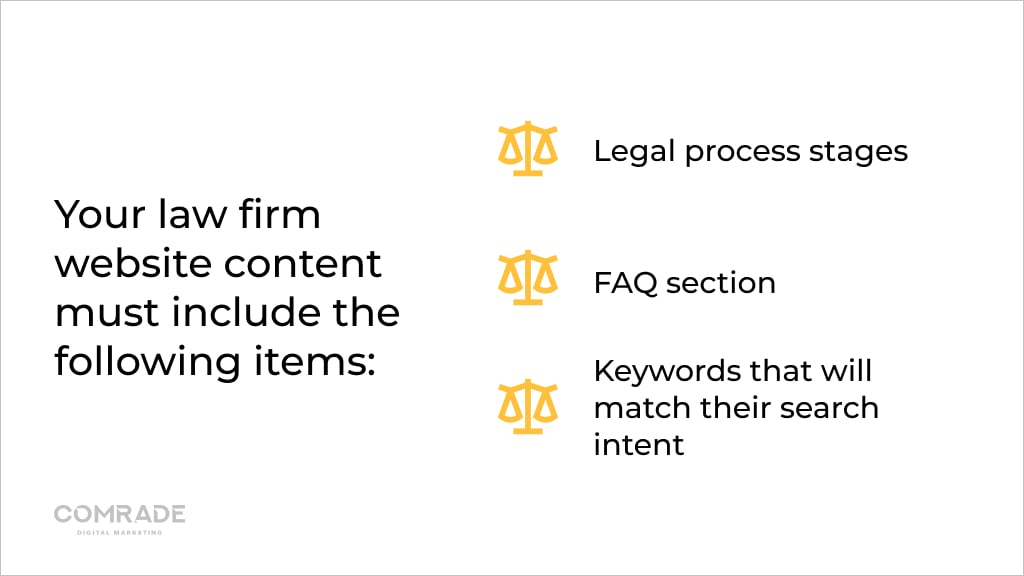
By demonstrating your expertise through valuable content, you establish trust and position yourself as a reliable source of information. This can be achieved through blog articles, whitepapers, case studies, or informative guides that address common legal concerns and provide practical solutions. Remember, the goal is to showcase your knowledge and expertise while offering valuable resources that resonate with your audience’s needs.
2. Describe Difficult Cases
To further demonstrate your skill as a law firm, consider showcasing your experience by describing difficult cases you have successfully handled. Highlight the complexity of the legal challenges you faced and provide an overview of how you navigated through them. This helps potential clients understand the depth of your knowledge and the range of cases you are capable of handling.
Describe the strategies employed, legal precedents utilized, and the positive outcomes achieved for your clients. However, be mindful of maintaining client confidentiality and adhere to ethical guidelines when discussing specific cases. Focus on providing a general overview and emphasizing the positive impact you made on behalf of your clients.
By showcasing your ability to handle difficult cases, you establish trust and credibility, attracting clients who may be facing similar challenges and seeking legal expertise.
3. Write about Particular Case Types
Focus on writing about particular case types that align with your law firm’s focus. By showcasing your knowledge and experience in specific practice areas, you position yourself as an authority in those fields.
Craft informative content that addresses the unique challenges, legal nuances, and common questions associated with each case type. For instance, if your firm specializes in personal injury law, create content that discusses different types of accidents, liability issues, and the steps involved in pursuing a personal injury claim.
By providing valuable insights into particular case types, you establish credibility and attract potential clients who require assistance in those specific areas of law.
4. Highlight Emotionally Rewarding Experiences
Copywriting can effectively demonstrate your legal prowess by highlighting emotionally rewarding experiences you have had with clients. Share stories that emphasize the positive impact your firm has made on clients’ lives, showcasing your ability to provide compassionate legal representation.

Describe instances where you helped clients overcome difficult circumstances, secured justice, or obtained favorable outcomes. Emphasize the human element and the positive emotional impact your legal services have on your clients’ well-being.
By highlighting emotionally rewarding experiences, you convey not only your abilities but also your dedication to client satisfaction and achieving meaningful results. Such stories can resonate with potential clients and demonstrate the genuine care and commitment your law firm offers.
Comrade Digital Marketing Agency can help you with the above if you’re unsure how to go about it. Schedule a free consultation.
Legal Copywriting Mistakes
Avoid Self-Hype
As a law firm, it’s essential to strike the right balance when it comes to promoting your services. While it’s important to showcase your expertise, it’s equally crucial to avoid self-hype. Remember, you’re an attorney, not a salesperson.
Instead of using clichés like “expert” or “best,” focus on highlighting your successful cases and client testimonials. Let your track record speak for itself. When crafting your copy, emphasize the value you bring to your clients and how you can help them overcome their legal challenges.
By presenting your accomplishments and capabilities in a modest and professional manner, you can build trust and credibility with your audience.
Steer Clear of Scare Tactics
While it’s important to be upfront with clients about the difficulties and costs associated with their legal matters, it’s crucial to avoid scare tactics.
Clients may already feel intimidated by the legal process and the potential expenses involved. Be transparent and honest, but communicate in a clear and direct manner without sensationalizing the situation.
Provide them with the necessary information to make informed decisions without unnecessarily instilling fear. Focus on addressing their concerns, explaining the legal process in a simplified way, and offering reassurance.
By maintaining a compassionate and informative approach, you can build trust and foster a positive client-lawyer relationship.
Say No to Legal Jargon
Legal jargon can be overwhelming and confusing for everyday readers. To effectively communicate with your audience, it’s important to write in an interesting and understandable way.
Even though you want to establish yourself as an authority in your field, it’s crucial to be approachable in your copy. Avoid using complex legal terminology and instead, opt for plain language that your target audience can easily comprehend. Break down complicated concepts into simple terms and provide clear explanations. By making your content accessible, you can engage readers and ensure that they understand the information you are conveying.
Remember, your goal is to inspire and inform, so focus on delivering your message in a reader-friendly manner that connects with your audience.
Legal Copywriting and Marketing Advice
Legal copywriting does more than demonstrate competence. It gives prospective clients a taste of your legal knowledge upfront. As the foundation of all marketing efforts, it’s important to understand the nuances of writing different kinds of legal marketing copy.
The first step to convincing website visitors they should hire you is to craft copy that speaks to your potential clients. What this sounds like depends on your type of law firm, who your target audience is, and what their needs are.
Write for Real People
It’s fundamental to remember your law firm’s website copywriting is for real people, who are looking at your law firm as a solution to their real problems. You want to be sensitive to their emotional state, draw them in, and build rapport.
Your website content and search engine optimization strategy must center around the needs of your clients, so your law firm ranks in search engine results pages and appeals to readers. We’ve seen many law firms fail to capitalize on their web pages because they merely list services but don’t explain how they help their clients.
Showcase Both Expertise and Benefits
We advise formulating your copy from a combination of keyword research results and real questions your law firm’s clients ask. This not only orientates readers but also helps search engines understand your content.
For example, take the first sentence on the About Us page of the African law firm Cliffe Dekker Hofmeyer:
“We are able to provide experienced legal support and an authentic knowledge-based and cost-effective legal service for clients looking to do business in key markets across Africa.”
Can you see how in one sentence, they’ve simultaneously explained what they do and how it benefits prospective clients?
Legal Copywriting for Law Firm Ads
Your ads must be short and straight to the point to get qualified leads. With PPC for lawyers, you don’t have space to write lengthy and descriptive messages. Ideally, you should sum up your ad in one sentence that perfectly encapsulates your message.
Naturally, your headline should grab a reader’s attention and show benefits, not features. Potential clients aren’t interested in what you do. They want to know how your law firm will benefit them.
Examples of good headlines for search ads include:
- Personal Injury Attorneys—Assistance with Injury Claims.
- Personal Injury Lawyer—No Win, No Fee.
- Divorce Lawyers—Don’t Wait Until It’s Too Late
The underlined words are likely all keywords that match the search query of users. Keywords help you make the most of your ads, ensuring your messages resonate with users who need your legal services.
You’ll also want to include a strong call to action (CTA) to close the deal and convince lawyer leads to click your ad. Make sure your intentions are clear and only have one CTA per ad.
Some great examples of CTAs are:
- Direct answer: Call, download, ask a lawyer online now, etc.

- Lead generation: Subscribe, contact us, enroll, etc.

- Engagement: Watch, view, discover, reach, etc.

Why Do Law Firms Need SEO Copywriting
Throughout this blog, we’ve mentioned using keywords to attract more clients. That’s because online marketing adds a layer of complexity to content marketing copy. Not only do you need to master how to use words persuasively, but you also need to weave in search engine optimization (SEO) best practices.
Legal copywriting should be SEO-optimized, meaning it should meet both your target market and search engine’s expectations. This starts with keyword research, i.e., identifying the word, terms, and phrases potential clients type into Google most frequently when searching for law firms and legal advice.
If you’re a patent lawyer, you might find “intellectual property” is a popular keyword, so you’ll want to develop fresh and informative content around this keyword and use it on your website, landing pages, blog, and social media for lawyers.
The keywords you use are incumbent on your law firm’s specialty, trending terms, and phrases used by social media users. Tools like Google Keyword Planner, Ahrefs, Ubersuggest, and SEMrush can assist you with finding the most valuable and high-performing keywords for your law firm.
Examples of Great Law Firm Copywriting
1. Reputation Guards
Reputation Guards’ website excels in its strategic use of headers and sub-headers throughout the site. The headings effectively capture visitors’ attention and convey key messages succinctly. The site’s well-structured navigation menu enhances user experience, ensuring easy access to relevant information. Overall, Reputation Guards’ copywriting demonstrates their expertise in managing and protecting online reputations.

Reputation Guards’ website not only features compelling copy but also excels in its user-friendly design and intuitive navigation. The strategically placed contact buttons prompt visitors to take action and inquire about their services. The website’s clean and professional layout creates a sense of trust and reliability, which is crucial when dealing with online reputation management.
2. Barnes & Thornburg
Barnes & Thornburg’s website stands out with its comprehensive and informative content across various practice areas. Their copywriting effectively communicates the firm’s expertise and depth of knowledge in each area of law. The site incorporates well-crafted headers and sub-headers that guide visitors through the different sections, making it easy to find relevant information. Barnes & Thornburg’s copywriting excels in providing valuable insights and practical advice, positioning them as trusted advisors for their clients.

Barnes & Thornburg’s website not only showcases excellent copywriting but also pays attention to the visual presentation of information. The use of clear and concise subheadings, bullet points, and summaries in different practice areas ensures easy comprehension for visitors seeking specific legal services. Their lawyer website design reinforces the firm’s professionalism and commitment to providing reliable and comprehensive legal counsel.
3. Michelman & Robinson
Michelman & Robinson’s website impresses with its effective use of copywriting to highlight their geographic reach and depth of experience. The firm’s homepage prominently features their regional presence, with specific information on offices across different locations. The copy conveys their knowledge of local laws and regulations, instilling confidence in potential clients.

Michelman & Robinson’s website not only excels in copywriting but also provides visitors with a sense of the firm’s geographic reach and expertise. By emphasizing its local presence, the firm positions itself as a trusted resource for clients seeking legal representation in specific regions. The site’s effective use of headers, sub-headers, and concise information within each practice area establishes Michelman & Robinson as a go-to law firm for clients in their respective locations.
4. Bailey Glasser
Bailey Glasser’s website stands out with its impactful copywriting, particularly in its practice areas section. The firm effectively utilizes headers and sub-headers to provide an overview of their specialized legal services. Each practice area is accompanied by concise yet informative content, allowing visitors to quickly understand the firm’s expertise in various fields. Additionally, the site’s navigation menu is well-structured, enabling easy access to different practice areas and other essential information.
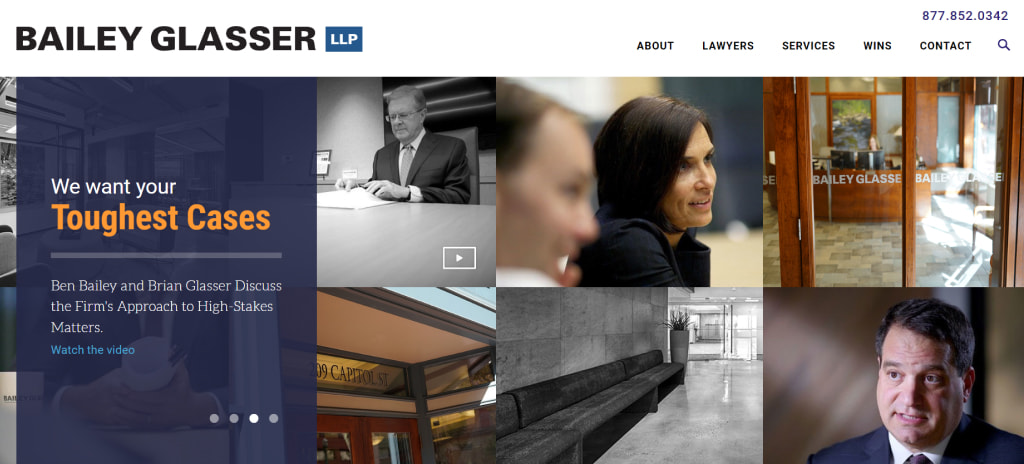
Bailey Glasser’s website showcases excellent copywriting that communicates the firm’s specialization and experience in a clear and concise manner. The headings and subheadings within each practice area effectively guide visitors to the specific legal services they are seeking. The site’s user-friendly design and intuitive navigation contribute to an enhanced user experience, making it easier for potential clients to explore and engage with the firm.
5. Peckar & Abramson
Peckar & Abramson’s website excels in its copywriting, specifically in its contact and navigation sections. The firm strategically places contact buttons throughout the site, making it convenient for visitors to reach out for inquiries or consultations. The navigation menu is well-organized, providing easy access to various practice areas and resources. Additionally, the site incorporates concise descriptions and subheadings in their practice areas, guiding visitors to the relevant legal services they require.
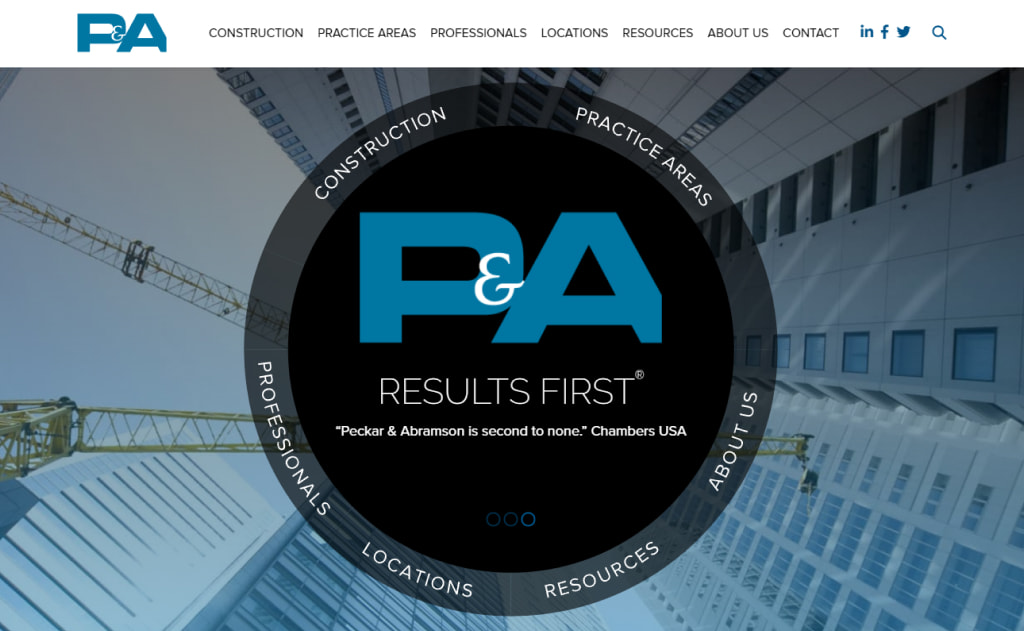
Peckar & Abramson’s website demonstrates excellent copywriting that optimizes user experience and encourages interaction. By strategically placing contact buttons and ensuring easy navigation, the firm makes it seamless for potential clients to connect with them. The clear and concise descriptions within practice areas showcase the firm’s expertise and specialization, further establishing trust and credibility.
Who Should Do the Copywriting for My Law Firm?
Lawyers vs. copywriters, which are better? We’re asked this a lot by our legal industry clients. In our experience, it’s better to hand over the copywriting to professional wordsmiths and allow our clients to proofread the copy. This is because a good legal copywriter can translate legalese into solid marketing copy and understand which tactics are best to attract new clients.
If you need seasoned legal copywriters to transform your law firm’s website into a lead magnet and create web copy that’s persuasive, we can help. Comrade’s professional copywriters can increase your sales-qualified leads by 70% on average. Contact us to increase your client roster and revenue.

